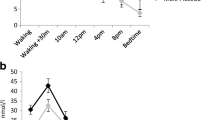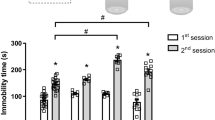Abstract
Alprazolam (AL), a benzodiazepine which activates gamma-amino butyrric acid (GA-BA)-ergic receptors, exerts a clear inhibitory effect on the activity of the hypothalamo-pitu-itary-adrenal (HPA) axis and is able to markedly reduce the ACTH response to metyrapone-induced inhibition of glucocorticoid feedback. It has been suggested that its inhibitory action could be regulated by CRH or AVP mediated mechanisms. However, the effect of benzodi-azepines on the HPA response to CRH or AVP is contradictory. It has been shown that benzodi-azepines have specific receptors on the adrenal gland but it is unclear if they mediate biological effects in humans. In order to further clarify the mechanisms underlying the inhibitory effect of benzodiazepine on HPA axis in humans, we studied the effect of AL (0.02 mg/kg po at −90 min) or placebo in 7 healthy young volunteers (7 female, age: 26–34 yr; wt: 50–58 kg, BMI 20–22 kg/m2) on: 1) the ACTH and cortisol responses to hCRH (2.0 μg/kg iv at 0 min) or AVP (0.17 U/kg im at 0 min); 2) the cortisol, aldosterone and DHEA responses to ACTH 1–24 (0.06 and 250 μg iv at 0 and 60 min, respectively). After placebo, the ACTH and cortisol responses to hCRH (peaks, mean±SE: 29.8± 4.4 pg/ml and 199.3±19.6 μg/l) were similar to those recorded after AVP (31.7±6.5 pg/ml and 164.8±18.0 μg/l); the cortisol response to 0.06 μg ACTH (190.4±11.8 μg/l) was similar to that recorded after hCRH and AVP but lower (p<0.01) than that after 250 μg ACTH (260.6±17.4 μg/l). AL did not modify the ACTH response to both hCRH (42.5±7.1 pg/ml) and AVP (33.3±2.7 pg/ml), which even showed a trend toward increase. AL also failed to significantly modify the cortisol response to both hCRH (156.3±12.7 μg/l) and AVP (119.4±14.5 μg/l), which, on the other hand, showed a trend toward decrease. The cortisol peaks after 0.06 μg ACTH were significantly reduced (p<0.02) by AL pre-treatment (115.0±7.7 μg/l) which, in turn, did not modify the cortisol response to the subsequent ACTH bolus (214.7±16.6 μg/l). The DHEA and aldos-terone responses to all the ACTH doses were not significantly modified by AL. In conclusion, these data show that the HPA response to AVP as well as to hCRH is refractory to the inhibitory effect of AL which, in turn, blunts the cortisol response to low ACTH dose. These findings suggest that both CRH- and AVP-mediated mechanisms could underlie the CNS-mediated inhibitory effect of AL on HPA axis; in the meantime, these results suggest that benzodiazepines could also act on adrenal gland by blunting the sensitivity of the fasciculata zone to ACTH.
Similar content being viewed by others
References
Charney D.S., Breier A., Jatlow P.I., Heninger G.R. Behavioural, biochemical and blood pressure responses to alprazolam in healthy subjects: interactions with yohimbine. Psychopharmacology (Berl.) 1986, 88: 133–140.
Calogero A.E, Galactic W.T., Chrousos G.P., Gold P.W. Interaction between GABAergic neurotransmission and rat hypothalamic corticotropin-releasing hormone secretion in vitro. Brain Res. 1988, 463: 28–36.
Risby E.D., Hsiao J.K., Golden R.N., Potter W.Z. Intravenous alprazolam challenge in normal subjects. Biochemical, cardiovascular, and behavioral effects. Psychopharmacology (Berl.) 1989, 99: 508–514.
Kalogeras K.T., Calogero A.E., Kuribayiashi T., et al. In vitro and in vivo effects of the triazolobenzodiazepine alprazolam on hypothalamo-pituitary-adrenal function: pharmacological and clinical implications. J. Clin. Endocrinol. Metab. 1990, 70: 1462–1471.
Zemishlany Z., McQueeney R., Gabriel S.M., Davidson M. Neuroendocrine and monoaminergic responses to acute administration of alprazolam in normal subjects. Neuropsychobiology 1990, 23: 124–128.
Breier A., Davis O., Buchanan R., et al. Effects of alprazolam on pituitary-adrenal and catecholaminergic responses to metabolic stress in humans. Biol. Psychiatry 1992, 32: 880–890.
Torpy D.J., Grice J.E., Hockings G.I., Walters M.M., Crosbie G.V., Jackson R.V. Alprazolam blocks the nalox-one-stimulated hypothalamo-pituitary-adrenal axis in man. J. Clin. Endocrinol. Metab. 1993, 76: 388–392.
Torpy D.J., Grice I.E., Hockings G.I., Walters M.M., Crosbie G.V., Jackson R.V. Alprazolam attenuates vasopressin-stimulated adrenocorticotropin and cortisol release: evidence for synergy between vasopressin and corticotropin-releasing hormone in humans. J. Clin. Endocrinol. Metab. 1994, 79: 140–144.
Roher T., von Richthofen V., Schulz C., Beyer J., Lehnert H. The stress, but not corticotropin-releasing hormone-induced activation of the pituitary-adrenal axis in man is blocked by alprazolam. Horm. Metab. Res. 1994, 26: 200–206.
Prichett D.B., Sontheimer H., Shivers B., et al. Importance of a novel GABA A receptor subunit for benzodiazepine pharmacology. Nature 1989, 338: 582–585.
Lopez A.L, Katol R.G, Noyes R. Reduction in urinary free cortisol during benzodiazepine treatment of panic disorder. Psychoneuroendocrinology 1990, 15: 23–28.
Arvat E., Maccagno B., Ramunni J., et al. Effects of dexametasone and alprazolam, a benzodiazepine, on the stimulatory effect of Hexarelin, a synthetic GHRP, on ACTH, cortisol and GH secretion in humans. Neuroendocrinology 1998, 67: 310–316.
Arvat E., Maccagno B., Ramunni J., et al. The inhibitory effect of alprazolam, a benzodiazepine, overrides the stimulatory effect of metyrapone-induced lack of negative cortisol feedback on corticotroph secretion in humans. J. Clin. Endocrinol. Metab. 1999, 84: 2611–2615.
Cedarbaum J.M., Aghajanian G.K. Catecholamine receptors on locus coeruleus neurones: pharmacological characterization. Eur. J. Pharmacol. 1977, 44: 375–385.
Hashimoto K., Yunoki S., Takahara J., Ofuji T. ACTH release in pituitary cell cultures. Effects of neurogenic peptides and neurotransmitter substances on ACTH release induced by hypothalamic corticotropin releasing factor (CRF). Endocrinol. Jpn. 1979, 26: 103–109.
Gaillard R.C., Al-Damluji S. Stress and the pituitary-adrenal axis. Baillieres Clin. Endocrinol. Metab. 1987, 2: 319–349.
Owens M.J., Bissette G., Neneroff C.B. Acute effects of al-prazolam and adinazolam on the concentrations of corticotropin — releasing factor in the rat brain. Synapse 1989, 4: 196–202.
Korbonits M., Trainer P.J., Edwards R., Besser J.M., Grossman A.B. Benzodiazepines attenuate the pituitary-adrenal responses to corticotrophin-releasing hormone in healthy volunteers but not in patients with Cushing’s syndrome. Clin. Endocrinol. 1995, 43: 29–35.
Wible J.H., Zerbe R.L., Di Micco J.A. Benzodiazepine receptor modulate circulating plasma vasopressin concentration. Brain Res. 1985, 359: 368–370.
Hillhouse E.W., Milton N.G.N. Effect of noradrenaline and gamma-aminobutyrric acid on the secretion of corticotrophin-releasing factor-41 and arginine vaso-pressin from rat hypothalamus in vitro. J. Endocrinol. 1989, 122: 719–723.
Papadopolous V. Pheripheral-type benzodiazepine/diazepam binding inhibitor receptor: biological role in steroidogenic cell function. Endocr. Rev. 1993, 14: 222–240.
Yanagibashi K., Ohno Y., Nakamichim N., et al. Peripheral-type benzodiazepine receptors are involved in the regulation of cholesterol side chain cleavage in adrenocortical mitochondrial. J. Biochem. 1989, 106: 1026–1029.
Van Oers H.J.J., de Kloet E.R., Li C., Levine S. The ontogeny of glucocorticoid negative feedback: influence of maternal deprivation. Endocrinology 1998, 139: 2838–2846.
Zilz A., Hua L., Castello R., Papadopoulos V., Widmaier E.P. Developmental expression of the peripheral-type benzodiazepine receptor and the advent of steroidogenesis in rat adrenal glands. Endocrinology 1999, 140: 859–864.
Eriksson E., Carlsson M., Nilsson C., Soderpalm B. Does alprazolam, in contrast to diazepam, activate alpha-2-adrenoceptors involved in the regulation of rat growth hormone secretion? Life Sci. 1986, 39: 1491–1498.
Plotsky P.M., Cunningham E.T., Widmaier E.P. Catechola-minergic modulation of corticotropin-releasing factor and adrenocorticotropin secretion. Endocr. Rev. 1989, 10: 437–445.
De Kloet E.R., Vreugdehil E., Oitzl M.S., Joels M. Brain corticosteroid receptor balance in health and disease. Endocr. Rev. 1998, 19: 269–301.
Conte-Devolx B., Guillaume V., Boudouresque F., et al. Effects of metyrapone infusion on corticotropin-releasing factor and arginine vasopressin secretion into the hy-pophysial portal blood of conscious, unrestrained rams. Acta Endocrinol. 1992, 127: 435–440.
Arvat E., Maccagno B., Giordano R., et al. Mineralo-corticoid receptor blockade by canrenoate increases both spontaneous and stimulated adrenal function in humans. J. Clin. Endocrinol. Metab. 2001, 86: 3176–3181.
Author information
Authors and Affiliations
Corresponding author
Rights and permissions
About this article
Cite this article
Grottoli, S., Maccagno, B., Ramunni, J. et al. Alprazolam, a benzodiazepine, does not modify the ACTH and cortisol response to hCRH and AVP, but blunts the cortisol response to ACTH in humans. J Endocrinol Invest 25, 420–425 (2002). https://doi.org/10.1007/BF03344031
Accepted:
Published:
Issue Date:
DOI: https://doi.org/10.1007/BF03344031




